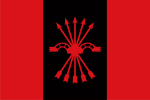Philippine Falange
Spanish National Assemblies Juntas Nacional Española | |
|---|---|
 | |
| Leader | Andrés Soriano Enrique Zobel |
| Founded | 1936 |
| Ideology | Falangism |
| Political position | Third Position |
| Party flag | |
 | |
| Part of a series on |
| Falangism |
|---|
 Yoke and arrows |
The Philippine Falange, the informal name for the Spanish National Assemblies of the Philippines(Juntas Nacional Española) was a Philippine falangist political party that was a branch of the Spanish Falange.[1] It was founded in 1936.[2] The party was initially led from the late 1930s by Spanish citizen and businessman Andrés Soriano.[3][4] A leadership struggle occurred between Martín Pou and Enrique Zóbel de Ayala.[5]
The party was effectively dissolved when Soriano applied for, and was quietly granted by the government, Filipino citizenship, in large measure because of a desire not to have a major political formation within the Philippines which was at least tacitly supportive of the Axis Powers, as Franco's Falange and subsequent Spanish Government were; other prominent followed suit, preventing the threat of their properties being seized by the Allied powers. Other members collaborated with the Japanese during the occupation, excluding Soriano who joined with Manuel Quezon and the government of the Philippine Commonwealth in exile, in the United States, as well as the Spanish Filipinos who formed Commonwealth military and guerrilla forces in Negros in the Philippines.
References
- ^ Hermógenes E. Bacareza. A history of Philippine-German relations. National Economic and Development Authority (NEDA) - APO Production Unit EDSA), 1980. Pp. 127.
- ^ Stanley Payne. Fascism in Spain, 1923-1977. Madison, Wisconsin, USA: Wisconsin University Press, 1999. Pp. 538.
- ^ Hermógenes E. Bacareza. A history of Philippine-German relations. National Economic and Development Authority (NEDA) - APO Production Unit EDSA), 1980. Pp. 127.
- ^ Philippine studies , Volume 43. Ateneo de Manila University Press, 1995. Pp. 6.
- ^ Hermógenes E. Bacareza. A history of Philippine-German relations. National Economic and Development Authority (NEDA) - APO Production Unit EDSA), 1980. Pp. 127.
